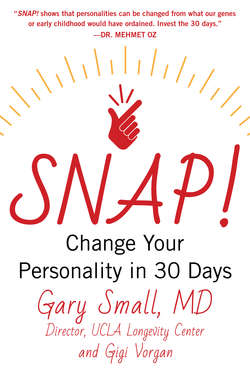Читать книгу SNAP! - Gary Small - Страница 16
На сайте Литреса книга снята с продажи.
Your Personality Impacts Your Life
ОглавлениеSome individuals readily accept who they are and how their life is going, good or bad. They have no desire or drive to change anything about themselves, especially their personality. Many people, however, feel that one or more of their character traits are holding them back—affecting their relationships, careers, and all-around life satisfaction. If you are someone who wishes to change, there is good reason to do so. Compelling scientific evidence indicates that your personality predicts many important outcomes in your life, including your physical health, success in relationships, and financial security.
Your personality traits also influence your life-span expectancy. Extroverts who tend to be friendlier and more socially connected enjoy greater longevity than introverts. People who are more neurotic have a shorter life expectancy than do more emotionally stable individuals. A large British study showed that cardiovascular illnesses contributed to the increased risk of death in neurotic people. Less conscientious people don’t live as long as those who are more conscientious, and it’s not surprising that those prone to taking risks may live more exciting lives, but on average their life-spans are shorter.
Your brain health and risk for several age-related illnesses can be affected by your personality style. Developing memory loss is one of the greatest concerns that people have as they age, and when that memory loss interferes with an individual’s independence, it is called dementia. We know that healthy lifestyle strategies—exercising regularly, eating right, managing stress, and remaining social—can reduce the risk of dementia, but your personality style has an influence as well. Investigators at the Karolinska Institute in Stockholm, Sweden, assessed personality traits in more than 500 older adults without dementia and followed them on average for six years. High emotional stability in combination with high extraversion was the personality-trait pattern associated with the lowest risk of dementia as well as other mental disorders, such as major depression, substance abuse, and phobia. In socially isolated people, high emotional stability alone appeared to decrease the risk for cognitive decline.
Having high ratings on the conscientiousness scale predicts several significant life outcomes. A National Institute on Aging study published in the Journal of Economic Psychology showed that a person’s degree of conscientiousness has a major influence on career success. Other investigations indicate that higher degrees of conscientiousness are associated with higher income levels, regardless of an individual’s type of work. That trait also predicts the duration and happiness of a person’s marriage. And because conscientious people are more fastidious about their health care, they not only live longer; they also are less likely to suffer a stroke, develop high blood pressure, or get Alzheimer’s disease. Those better outcomes could in part reflect a conscientious person’s tendency to not smoke, avoid drinking alcohol in excess, and follow up on medical advice.
Personality Traits of Stand-Up Comedians
Stand-up comedians are very creative individuals who write and perform their material and either enjoy or suffer from immediate audience feedback. In contrast to actors, stand-ups tend to score high on disagreeableness, which may account for the disparaging humor of many. Although they don’t appear to be any more neurotic than people in the general population, they tend to be more introverted.
Many explanations contribute to these varied outcomes of an individual’s personality style. Neurotic people don’t handle stress well, and chronic stress can lead to depression, age-related physical illnesses, accidents, and other outcomes that make for a briefer life-span. They also don’t take care of their health as well as more emotionally stable individuals. By contrast, a friendly extrovert enjoys the support of a social network that can lend a hand when that person becomes ill or stressed out.
The bottom line is that we are no longer prisoners of our old personality traits. If we make the decision to free ourselves from those traits that hold us back, we can begin to achieve the life we want.
